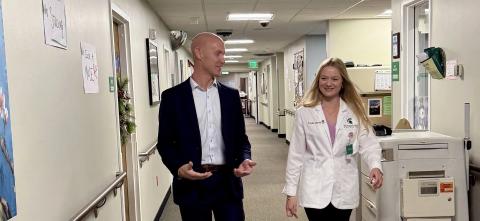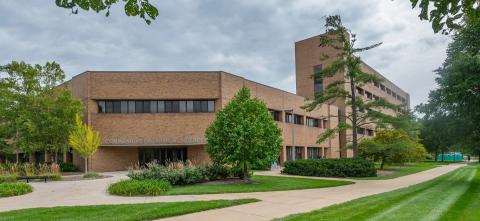
Learning Medicine by Living It
MSU’s Intergenerational Living Program pairs medical students with older adults in a senior living community, blending education with real-world care. By living alongside residents with dementia, students gain empathy, clinical insight and hands-on experience beyond the classroom.
AI Is a Lab Diamond’s Best Friend for Semiconductors
MSU has secured a $3 million NSF grant to use AI in growing high-quality lab diamonds for next-generation semiconductors. Partnering with Fraunhofer USA centers, the project aims to advance manufacturing innovation and strengthen the U.S. tech workforce.

Rep. Brixie Touts MSU Research As Essential to Maintaining Agricultural Diversity
Rep. Julie Brixie highlights MSU research as essential to protecting Michigan’s diverse agriculture. From climate pressures to labor and disease challenges, MSU partnerships help farmers adapt and keep the state’s agricultural identity strong.

New Fusion Energy Research Center Engages Students and DOE
Michigan State University has launched a $5 million fusion energy research center in partnership with the U.S. Department of Energy. The center engages students in cutting-edge plasma modeling to advance clean fusion energy.

Faculty Voice: Theatre Production at Beal Garden
Inspired by MSU’s Beal Seed Experiment, Assistant Professor Alexandria Davis brings Echoes from the Banks of the Red Cedar to life at Fairchild Theatre. The immersive production explores identity, change, and belonging through dance and storytelling.

Charter Schools Improve Outcomes for Students With and Without Disabilities
New research from Michigan State University found that after students with disabilities switched from a traditional public school to a charter school, their attendance and academic outcomes were comparable and, in some cases, even improved.

Study Finds Memories of Childhood Adversity Shift With Present-Day Relationships
New research from Michigan State University finds that how young adults recall adverse childhood experiences fluctuates based on the current quality of their relationships — particularly with their parents.

Virtual Reality Research Explores How Attention Shapes Memory
Researchers Ralf Schmälzle and Hee Jung Cho have published new work in the Journal of Communication. Their study investigates how virtual reality combined with eye-tracking can measure visual attention. The findings shed light on how attention and memory interact in immersive media environments.
Announcements
